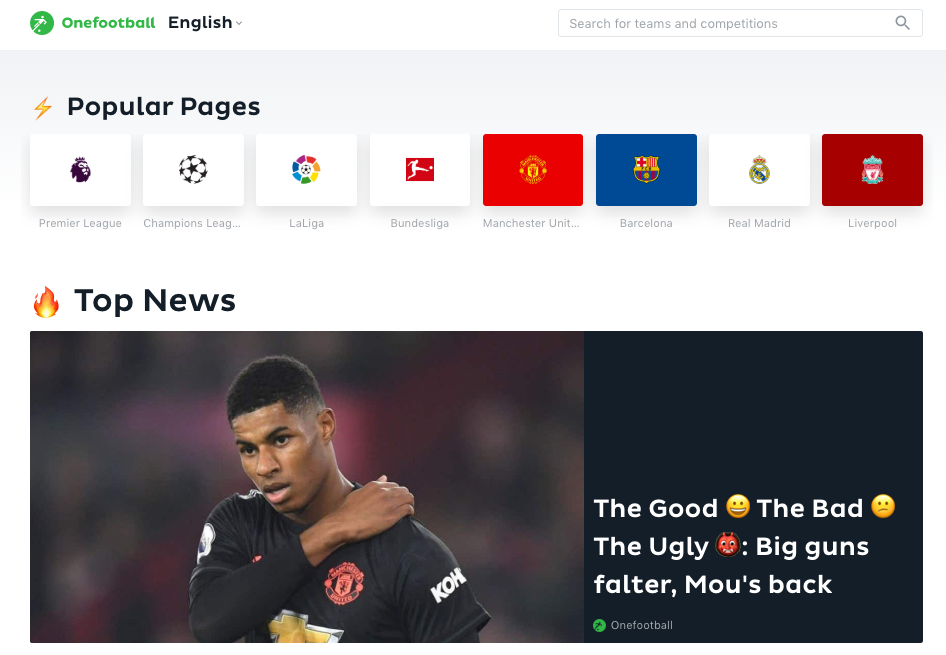Patrick Fischer on how Onefootball is winning with personalised content
In spite of tough competition too it has innovated commercially building sizeable ad and affiliate based revenues in imaginative and effective ways.
 |
Patrick Fischer, who joined the company in January 2019 as Chief Business Officer, is the man charged with taking Onefootball’s strategy forward in the coming years.
At DIS 2020 he will focus on the company’s monetisation methods. Here he explains why Onefootball has been successful so far and how relevance is the key to driving engagement.
***Take advantage of our offer for DIS 2020, taking place on 24 to 25 March 2020 in Berlin. By signing up for DIS 2020 by December 2nd you will save €600 on final delegate rates. Sign up here***
Onefootball is now over ten years old. Can you outline its journey up until now and then explain your role in its development?
Onefootball was founded back in 2008 with the vision to provide football fans globally with the go-to source for football content on mobile devices. We launched at a time when smartphones first came into existence and mobile apps kick-started the modern digital age. In fact, in 2009, Onefootball was the first sports app, and among the first 1,000 apps ever to be listed in the Apple App Store. Since then, the company has grown to become a reference model in the mobile platform business worldwide. I joined Onefootball in January 2019 as Chief Business Officer and the areas that fall under my responsibility are User Acquisition, User Engagement and User Monetisation. For me it’s all about understanding our customers and maximising their lifetime value.
Why do you think the app has been so successful and has attracted so many readers?
The core asset of Onefootball is relevance. Our users only get relevant content based on their interests – be it news, features or videos. The users follow their interests, not a source which could potentially have relevant content. In short: Onefootball is a platform with the most relevant content for every user. Personalised content and the ability to reach our users through push notifications are key success drivers. 90% of our users have enabled push notifications on their smartphones.

Which territories are you most successful in – and which do you find the most challenging? Do you see Africa and Asia as being important markets in the future?
Our biggest market is Brazil followed by the DACH region and Italy. English-speaking countries are challenging due to competition and/or size. But of course, we are always looking for opportunities in new markets. Onefootball is already available in twelve languages across all App stores and our newsroom is curating content from over 25.000 sources.
Do you think being based in Berlin gives you a different perspective from say being headquartered in London or Madrid?
Berlin offers everything we need to be successful. The city is attracting a lot of young and talented professionals from across the globe. At Onefootball we represent more than 40 nationalities. We have a great mix of international staff members in every department, which is very enriching on both a professional and personal level.
How important have podcasts and video been in extending the reach of your brand?
Video and audio are very important to us. In 2019 we founded the Onefootball Studios. The Studios team is producing video, audio and social content for all our platforms, including social media. The key objective of having a presence on social media is brand building. We understand that this is where we can reach our primary target group, the young Generation Z and Y.
What are the key ways you monetise the site? You recently signed a deal with Taboola. How will that impact on your growth? What are other revenue streams are important to you?
Our main initiative is building a state-of-the-art AdTech stack for our App business. As a global player with a lot of traffic working with leading DSPs has absolute priority. Programmatic advertising is really important to us. Our second business area is acting as a distribution partner for rightsholders allowing them to target relevant users for single matches, which are live streamed on pay-per-view basis in our app. We are currently running pay-per-view offerings in partnership with established rightsholders in Germany, Italy and Belgium. Further partnerships are already in the pipeline and due to be announced very soon.
What do you feel about The Athletic’s business model? Can sports fans be persuaded to part with subscriptions fees for high quality content?
I am a big fan of The Athletic, I wish them the best of luck for their project. In today’s digital era, it is obviously challenging to opt for a subscription-based business model. That said, if the quality is there and they manage to address a critical size of die-hard fans, I see a good chance for them to become a successful alternative to traditional publishers.
 |
***Take advantage of our offer for DIS 2020, taking place on 24 to 25 March 2020 in Berlin. By signing up for DIS 2020 by December 2nd you will save €600 on final delegate rates. Sign up here***
More like this
Podcast masterclass, part one: Equipment
[FIPP Insight Report] Events in magazine media: how to convert them into a revenue source
Podcast masterclass part 2: repurposing content
10 startups solving key issues for media companies and magazine publishers
Hatebase’s Timothy Quinn on the rise of hate speech and what the media can do to counter it







